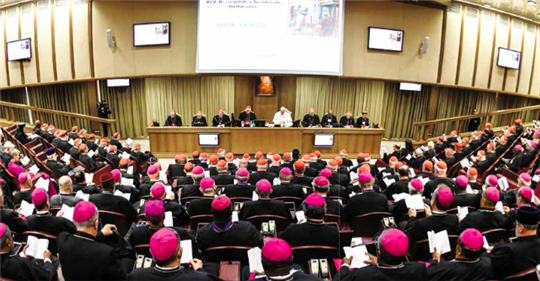
Love is Able to Find the Way
Ending with the key concept of “discernment:” how is the conscience formed? Passages from the presentation by the Archbishop of Vienna, which the Pope suggested to keep in mind while reading the Exhortation.Before entering into the text itself I would like to say, in a very personal way, why I read it with joy, gratitude, and with such strong emotion. In the ecclesial dialogue on marriage and the family there is often a tendency, perhaps unaware, to discuss these realities of life on the basis of two separate tracks. On the one hand there are marriages and families that are “regular,” that correspond to the rules, where everything is “fine” and “in order,” and then there are the “irregular” situations that represent a problem. Already the very term “irregular” suggests that such a distinction can be made very clearly.
Those, therefore, who find themselves on the side of the “irregular” families, must live with the fact that the “regular” families are on the other side. I am personally aware of how difficult it is for those who come from a “patchwork” family, due to the situation of my own family. The discussion of the Church in this regard may cause harm and can give the sense of exclusion.
Pope Francis’ Exhortation is guided by the phrase: “It is a matter of reaching out to everyone” (AL 297), as this is a fundamental understanding of the Gospel: we are all in need of mercy! “Let him who is without sin among you be the first to throw a stone” (Jn 8:7). We are all, regardless of the marriage or family situation in which we find ourselves, journeying. Even a marriage in which everything is “going well” is a journey. It must grow, learn, and overcome new phases. It knows sin and failure, and needs reconciliation and new beginnings, even in old age (cf. AL 297).
Pope Francis has succeeded in speaking about all situations without cataloguing them, without categorizing, with that outlook of fundamental benevolence that is associated with the heart of God, with the eyes of Jesus that exclude no one (cf. AL 297), that welcome all and grants the “joy of the Gospel” to all. [...] In this climate of welcome, the discourse on the Christian vision of marriage and the family becomes an invitation, an encouragement, to the joy of love in which we can believe and which excludes no one, » truly and sincerely no one. For me Amoris Laetitia is, first and foremost, a “linguistic event,” as was Evangelii Gaudium. Something has changed in ecclesial discussion. This change of language was already perceptible during the Synodol process. Between the two Synods of October 2014 and October 2015, we can clearly see how the tone became richer in esteem, as if the different situations in life had simply been accepted, without being immediately judged or condemned. In Amoris Laetitia this tone of language continues. Previously there is obviously not only a linguistic choice, but also a profound respect when faced with each person, who is never a “problematic case” in a “category,” but rather a unique person with his or her story and journey towards God. […]
This pervasive principle of “inclusion” clearly troubles some people. Does this not favor relativism? Does the frequently evoked mercy not become permissiveness? […] To clarify this, Pope Francis leaves no doubt regarding his intentions or our task: “As Christians, we can hardly stop advocating marriage simply to avoid countering contemporary sensibilities, or out of a desire to be fashionable or a sense of helplessness in the face of human and moral failings. We would be depriving the world of values that we can and must offer... What we need is a more responsible and generous effort to present the reasons and motivations for choosing marriage and the family, and in this way to help men and women better respond to the grace that God offers them” (AL 35).
Pope Francis is convinced that the Christian vision of marriage and the family also has an unchanged force of attraction. But it demands “a healthy dose of self-criticism.” “We also need to be humble and realistic, acknowledging that at times the way we present our Christian beliefs and treat other people has helped contribute to today’s problematic situation” (AL 36). […]
Pope Francis speaks of a profound trust in the hearts and the nostalgia of men. He expresses this very well in his reflections on education. Here we perceive the influence of the great Jesuit tradition in education in personal responsibility. He refers to two contrary dangers: “laissez-faire” and the obsession with controlling and dominating everything. On the one hand it is true that “Families cannot help but be places of support, guidance and direction… Vigilance is always necessary. Neglect is never beneficial” (AL 260). 
But vigilance can also become excessive: “....What is most important is the ability lovingly to help children grow in freedom, maturity, overall discipline, and real autonomy” (AL 261). I consider this thought on education very enlightening in connection with the pastoral practice of the Church. Indeed, precisely in this sense Pope Francis often returns to the issue of trust in the conscience of the faithful: “We have been called to form consciences, not to replace them” (AL 37). The great question, obviously, is this: how do we form consciences? How do we get to the key concept of this great document, the key to correctly understanding Pope Francis’ intentions: “Personal discernment,” especially in difficult and complex situations? […] It is “discernment” that gives a person a mature character, and the Christian path should be of help in reaching this personal maturity; not forming automatons, externally conditioned and remote-controlled, but people who have matured in their friendship with Christ. Only when this personal “discernment” is mature is it also possible to arrive at “pastoral discernment,” which is important, especially in “those situations that fall short of what the Lord demands of us” (AL 6). The eighth chapter refers to this “pastoral discernment,” a chapter likely to be of great interest not only to ecclesial public opinion, but also to the media. I should however mention that Pope Francis has described Chapters 4 and 5 as central, […] because of their content. “We cannot encourage a path of fidelity and mutual self-giving without encouraging the growth, strengthening, and deepening of conjugal and family love” (AL 89). These two central chapters of Amoris La-etitia will probably be skipped by many people keen on getting to the so-called “hot potatoes,” the critical points. […] Therefore it is unsurprising that it is largely the eighth chapter that has attracted attention and interest. Indeed, the question of how the Church treats these wounds, of how she treats the failure of love, has become for many a test to understand whether the Church is truly the place where God’s Mercy can be experienced.
This chapter owes much to the intense work of the two Synods, to the extensive discussions in the arenas of public and ecclesial opinion. Here the fruitfulness of Pope Francis’ method is shown. He expressly wished for an open discussion on the pastoral accompaniment of complex situations, and has been able to fully base this on the two texts that the two Synods presented to him to show the possibility of “accompanying, discerning and integrating weakness” (AL 291). Pope Francis explicitly makes his own the declarations that both Synods presented to him: “The Synod Fathers reached a general consensus, which I support” (AL 297). With regard to those who are divorced and civilly remarried, he states: “I am in agreement with the many Synod Fathers who observed that... the logic of integration is the key to their pastoral care... Such persons need to feel not as excommunicated members of the Church, but instead as living members, able to live and grow in the Church and experience her as a mother who welcomes them always...” (AL 299). But what does this mean in practice? Many rightly ask this question. The definitive answers are found in Amoris Laetitia, paragraph 300. These answers certainly offer material for further discussions, but they also provide an important clarification and an indication of the path to follow. “If we consider the immense variety of concrete situations... it is understandable that neither the Synod nor this Exhortation could be expected to provide a new set of general rules, canonical in nature and applicable to all cases.” Many expected such rules, and they will be disappointed. What is possible? The Pope says clearly: “What is possible is simply a renewed encouragement to undertake a responsible personal and pastoral discernment of particular cases.”
Naturally this poses the question: what does the Pope say in relation to access to the sacraments for people who live in “irregular” situations? Pope Benedict had already said that “easy recipes” do not exist (AL 298, note 333). Pope Francis reiterates the need to discern carefully the situation, in keeping with St. John Paul II’s Familiaris Consortio (84) (AL 298). “Discernment must help to find possible ways of responding to God and growing in the midst of limits. By thinking that everything is black and white, we sometimes close off the way of grace and of growth, and discourage paths of sanctification which give glory to God” (AL 305). He also reminds us of an important phrase from Evangelii Gaudium, 44: “A small step, in the midst of great human limitations, can be more pleasing to God than a life which appears outwardly in order but moves through the day without confronting great difficulties” (AL 304). […]
Is it an excessive challenge for pastors, for spiritual guides, and for communities if the “discernment of situations” is not regulated more precisely? Pope Francis acknowledges this concern: “I understand those who prefer a more rigorous pastoral care which leaves no room for confusion” (AL 308). However, he challenges this, remarking,“We put so many conditions on mercy that we empty it of its concrete meaning and real significance. That is the worst way of watering down the Gospel” (AL 311).
Pope Francis trusts in the “joy of love.” Love is able to find the way. It is the compass that shows us the road. It is both the goal and the path itself, because God is love and love is from God. Nothing is more demanding than love. It cannot be obtained cheaply. Therefore, no one should be afraid that Pope Francis invites us, with Amoris Laetitia, to take too easy a path. The road is not an easy one, but it is full of joy!